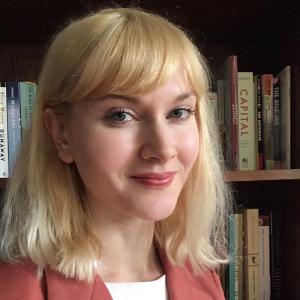ACLS Emerging Voices Fellowship brings Northwestern scholar to the Pozen Center
The yearlong program brings Maria Dikcis to UChicago for research, teaching, and public engagement, building on her study of 21st century American literature and media aesthetics
By Sarah Steimer
Reacting to the pandemic-induced economic downturn, the American Council of Learned Societies created a fellowship to support early career scholars. One such fellow, Maria A. Dikcis, started her year-long placement at U Chicago on Sept. 1 after being matched with the Pozen Family Center for Human Rights.
“ACLS’s innovative Emerging Voices Program is unique in the national landscape of postdoctoral fellowships,” says Mark Bradley, deputy dean of the Division of the Social Sciences. “It offers recent PhDs the opportunity not only to advance their own research and gain teaching experience but at the same time provides a platform for more public facing work.
Dikcis recently received her PhD from Northwestern University after defending her dissertation, titled “Ink, Wave, Signal, Code: Multiethnic American Poetry’s Media Ecologies After 1965.” In fact, her dissertation division chair nominated her for the fellowship on the same day she turned in the final chapter of her dissertation. In the reference letter, he lauds her for blending her scholarly excellence with her commitment to expanding humanities education to disadvantaged individuals.
“[The fellowship is] really this perfect intersection of my interests in not only scholarship and teaching, but also public engagement — specifically, on engagement that centers around social justice,” Dikcis says.
For the research component of her placement, Dikcis will be transforming her dissertation into a book, in addition to smaller projects. Her studies have focused on the intersection of 20th and 21st century American literature and media aesthetics, and the book project will specifically examine the influence of technological change on poetic form and racial subjectivity in the post-1965 era. The research explores how African American, Asian American and Latinx poets have used a wide variety of technology — print, audio, broadcast, digital, and beyond — to innovate new forms of racial representation.
“I'm trying to recenter the narrative and show that these poets and groups of writers have not simply been disenfranchised by media or have not been passive consumers of media,” she says. “But all along they have been key innovators and driving the narrative.”
Developing the book within the context of the Pozen Center, she says, helps in rooting the questions of poetics, representation and aesthetics in the social and the political. She’ll also receive mentorship from Edgar Garcia, an associate professor in the English Department and Director of Undergraduate Studies in Creative Writing.
Dikcis will teach during her time at U Chicago, likely in the winter or spring. Although the details of that course are yet unknown, her initial proposal included a course pitch that would appeal to English or Humanities. She says there’s been interest in her class on society and power, which explores how writers, artists, and activists use media to make interventions into conflicts such as the refugee crisis or police violence, or to change the way we think about representation and advocacy.
Under the public engagement component of the fellowship, Dikcis will work with Alice Kim, director of Human Rights Practice at the Pozen Center, on various projects. One will center on memory and human rights, which includes how public memorials are created for victims of police torture, for example. She’ll also work with Kim to develop a yearlong program of undergraduate internships around social justice, helping to match students with local organizations.
Depending on the state of the pandemic, there’s the potential to also develop a higher education in prison initiative, which could include a mixed spring quarter enrollment course where undergraduate U Chicago students would take a class alongside incarcerated students at Stateville Correctional Center, located about an hour from campus. The work would build on her leadership experience with the Cook County Jail Partnership under the Northwestern Prison Education Program.
“We are delighted that Maria will be a part of the Pozen Center’s Human Rights Lab working on issues of mass incarceration,” Bradley says. “The experience she brings around prison education will be invaluable to us for the work we are doing in this field and for her teaching of our students.”
The opportunity provided by the fellowship to develop her public engagement work is crucial to Dikcis, who calls this aspect fundamental to who she is as a teacher and scholar.
“Even though I hope to stay in the academy and eventually have a tenure-track job, I don’t plan to abandon my public-facing work,” she says. “I’m interested in the work that aims to break down the barriers between the academy and the wider public. This fellowship will help me to continue to develop those types of strategies and philosophies.”
 THE UNIVERSITY OF CHICAGO
THE UNIVERSITY OF CHICAGO


